
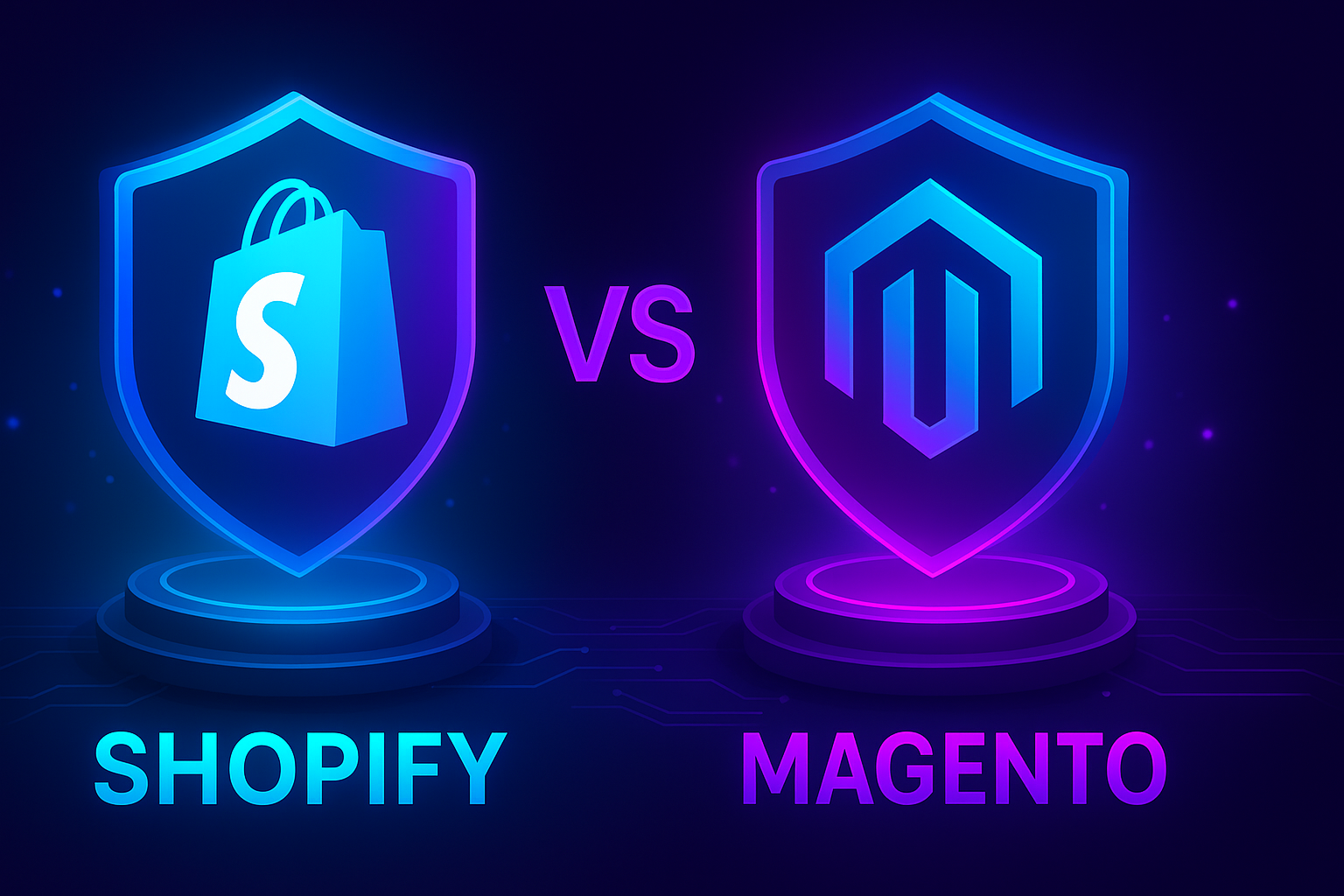
In the ever-growing world of ecommerce, businesses constantly seek effective ways to drive traffic, increase sales, and maximize their return on investment (ROI). One of the most powerful tools at their disposal is PPC (Pay-Per-Click) advertising, which allows merchants to reach highly targeted audiences quickly through paid ads on search engines, social media, and other platforms. But among the many options available, the choice of an ecommerce platform can significantly influence the performance and ultimate ROI of PPC efforts.
Two of the most popular ecommerce platforms worldwide are Shopify and Magento. Both platforms have extensive user bases and offer unique sets of features, but how do they fare specifically when it comes to PPC advertising? This blog takes a comprehensive look at Shopify vs Magento for PPC, examining their capabilities, strengths, challenges, and performance insights. Backed by data, case studies, and industry expertise, this analysis aims to help ecommerce businesses make informed decisions about their paid advertising strategies.
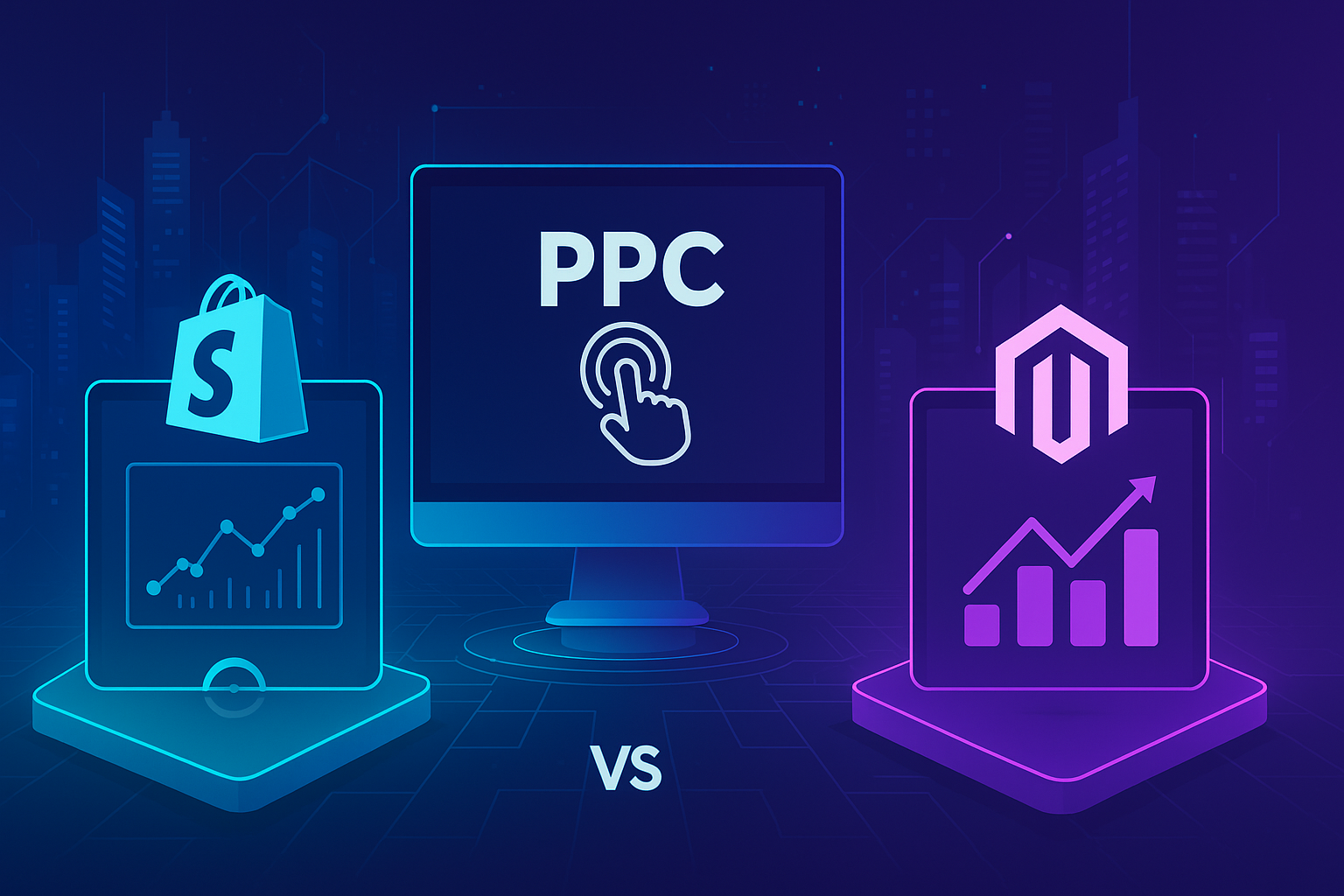
Both Shopify and Magento have proven track records as ecommerce platforms, but they approach store management and sales differently, especially when it comes to integrating and optimizing PPC campaigns.
Shopify has gained immense popularity for being a fully hosted, user-friendly platform. It offers built-in marketing tools and easy integrations with major PPC channels like Google Ads and Facebook Ads. Shopify’s primary appeal is its simplicity and speed. Merchants can set up stores quickly and start running PPC campaigns with minimal technical barriers.
Magento (owned by Adobe) is a highly customizable, open-source platform, allowing extensive design and functional modifications. It is commonly chosen by businesses with complex product catalogs, high traffic loads, or specific PPC needs that require tailored landing pages and tracking setups. Magento's flexibility comes with increased complexity and a steeper learning curve.
When exploring Shopify vs Magento for PPC, the core differences often revolve around ease of use versus customization capabilities, as well as cost considerations.
PPC, or Pay-Per-Click advertising, is a digital marketing model where advertisers pay only when their ad is clicked. This form of advertising is particularly valuable for ecommerce because:
Unlike SEO, which builds organic traffic over months, PPC delivers near-instant traffic, making it essential for ecommerce sites looking to accelerate growth or feature seasonal promotions.
Understanding how your ecommerce platform supports PPC campaign management is crucial, as it impacts ease of setup, tracking accuracy, campaign optimization, and ultimately ROI.
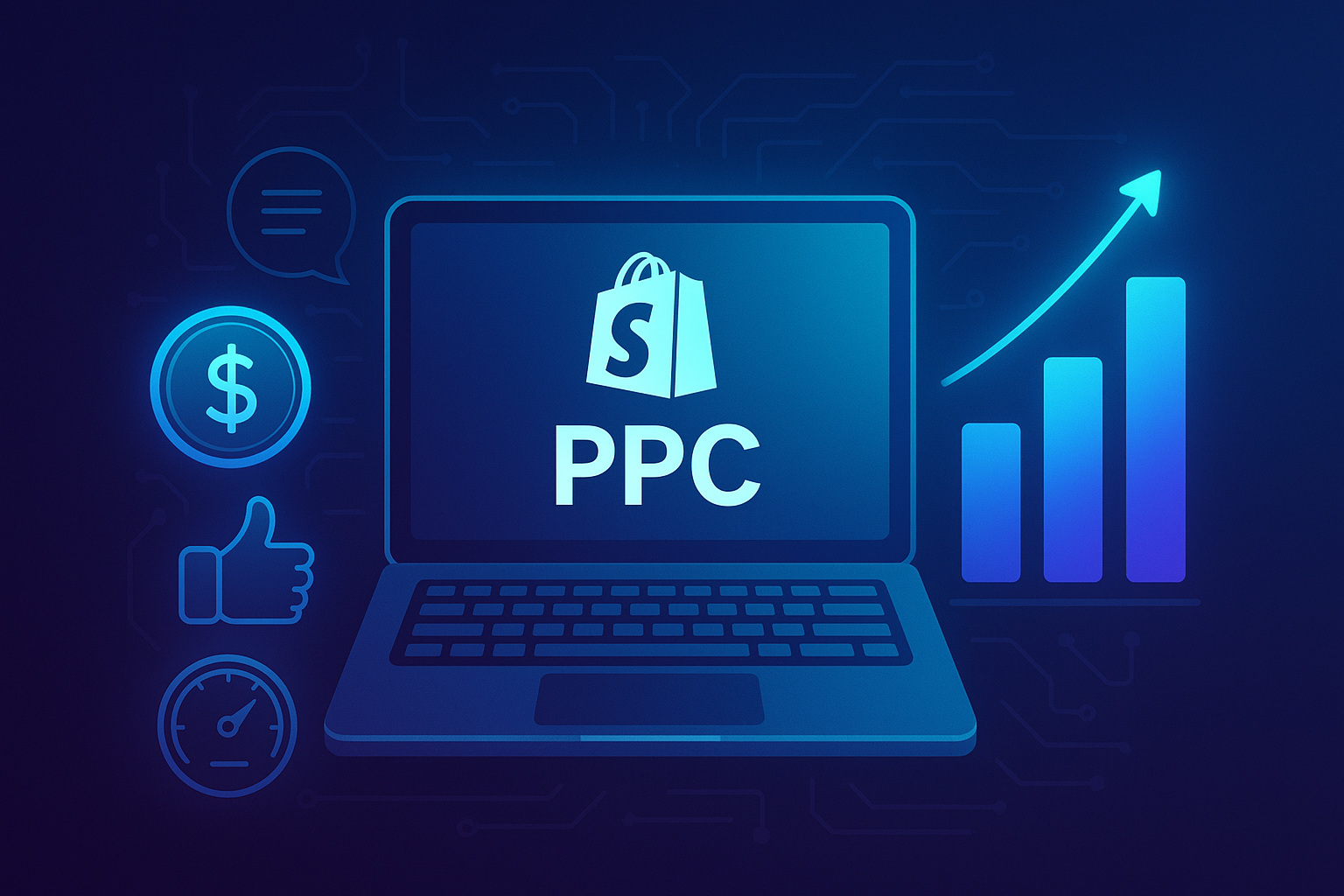
Shopify’s design inherently favors merchants seeking efficient PPC campaign deployment and easy ongoing management.
Shopify’s tight integration with PPC platforms is a major advantage. Users can connect their store with Google Merchant Center, Facebook Business Manager, Microsoft Ads, and others seamlessly. Built-in apps and plugins allow automating tasks such as product feed generation for dynamic ads. The user-friendly interface means merchants can launch paid campaigns quickly without the need for extensive technical expertise.
Shopify’s hosting is fully managed, so merchants need not worry about server performance impacting ad campaign delivery. Furthermore, Shopify’s pricing model is clear and affordable, which helps keep the total cost of ownership low. This allows allocating more budget directly to advertising rather than infrastructure.
With Shopify’s ecosystem, it is easy to set up pixel tracking and retarget users who visited the store but did not convert, a common strategy to improve ROAS (Return on Ad Spend). Many Shopify PPC advertising case studies highlight strong results in boosting conversions via remarketing ads.
Shopify gives merchants access to detailed sales and traffic reports, including PPC performance metrics such as clicks, sessions, bounce rates, and conversion paths. Google Analytics and Shopify’s native analytics combine to provide actionable insights to fine-tune campaigns.
Many Shopify-based ecommerce businesses report accelerated sales growth after running PPC campaigns thanks to the platform’s ease of linking product catalogs, comprehensive targeting options, and efficient checkout process. Shopify PPC advertising benefits companies aiming for fast market penetration.
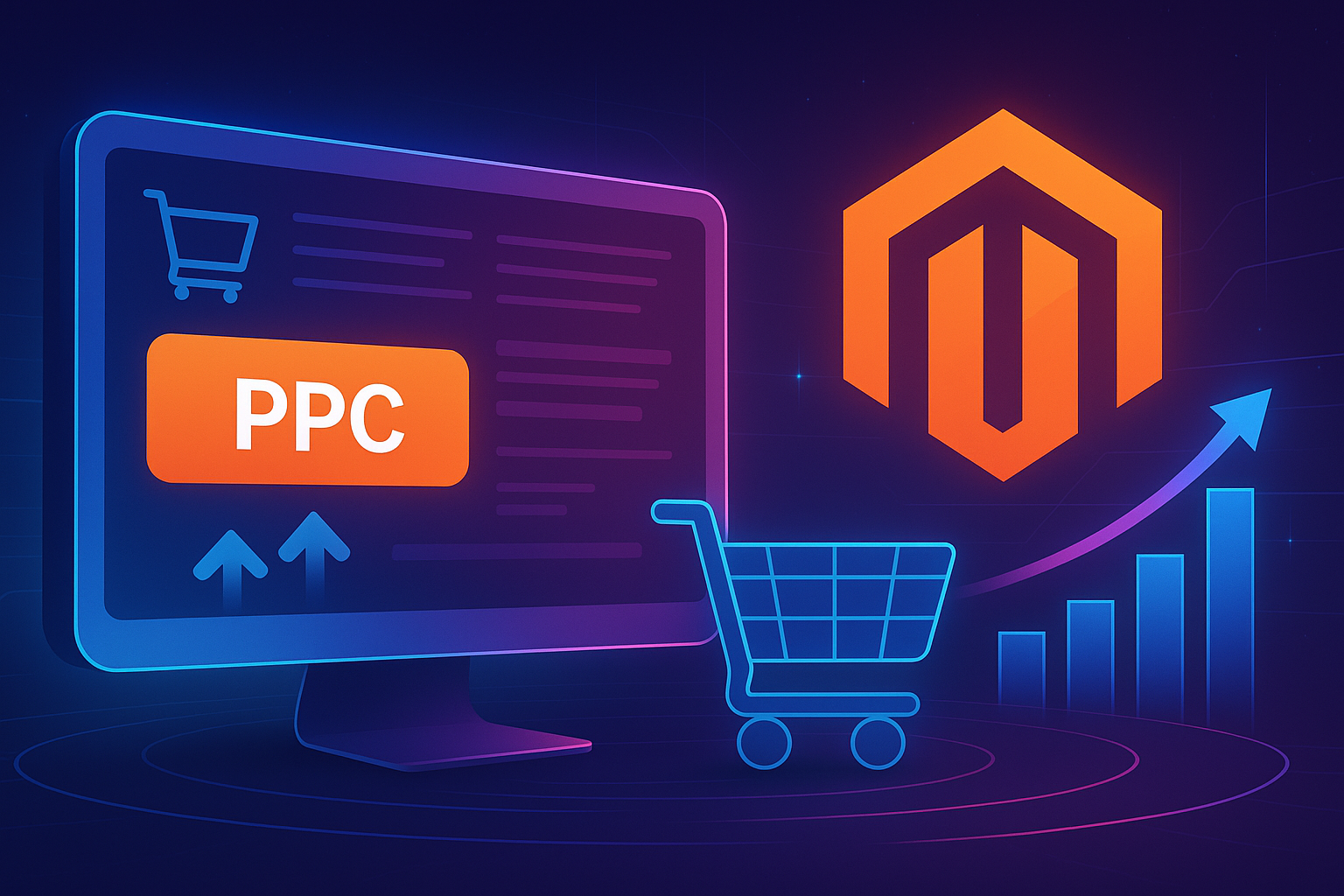
Magento offers more potential power and flexibility for PPC campaigns but requires technical know-how and higher investment.
Magento’s open-source architecture enables deep customization of landing pages, checkout flows, and even product recommendations aligned with PPC ad creatives. This can improve user experience and increase conversion rates when properly executed.
Magento handles large product catalogs and high traffic with the right hosting and optimization strategies. For enterprises running multiple PPC campaigns targeting diverse audiences at scale, Magento is often preferred.
However, effective Magento PPC performance depends heavily on developer support. Server optimization, caching, and integrating third-party tracking tools demand expertise and ongoing maintenance costs, which can affect overall PPC ROI if unmanaged.
Magento stores typically face higher setup costs, including hosting infrastructure, developer fees, and extensions for marketing automation or analytics tools. But the payoff can be substantial for businesses that need precision-targeted campaigns and custom analytics.
Case studies reveal that Magento ecommerce stores with professional PPC management and technical teams see significant uplift in PPC campaign efficiency and sales growth, especially for complex, enterprise-level campaigns.
| Feature | Shopify PPC Advertising | Magento PPC Performance |
|---|---|---|
| Ease of Use | Highly user-friendly for non-technical users | Requires technical expertise to manage |
| Speed of Store Launch | Rapid deployment, typically in days | Longer setup, often weeks to months |
| Total Cost of Ownership (TCO) | Lower initial and running costs | Higher setup and maintenance expenses |
| Customization | Limited to platform capabilities | Extensive customization options |
| PPC Data & Analytics | Built-in analytics with simple reporting | Requires integrated third-party analytics tools |
| Scalability | Great for SMBs and mid-sized businesses | Ideal for large enterprises with complex needs |
| Remarketing and Retargeting | Strong, easy pixel implementation | Powerful but requires a custom setup |
| Server Performance & Uptime | Managed hosting ensures reliability | Needs proper optimization to handle the load |
Understanding the variables influencing PPC ROI helps you better leverage your ecommerce platform for paid ads:
Shopify excels with minimal technical support required, making it ideal for startups and SMBs. Magento demands developer investment but unlocks tailored user experiences.
Shopify’s lower TCO leaves more ad budget available, improving overall campaign efficiency. Magento may require higher marketing budgets, accounting for development costs.
Small and medium-sized product catalogs fit well with Shopify’s simplicity. Large catalogs with multi-regional PPC campaigns benefit from Magento’s scalability.
Complex campaigns with custom landing pages and multi-channel tracking usually gain from Magento’s flexibility.
Skilled PPC agencies and marketers can maximize ROI on both platforms, but especially Magento, where technical setup impacts campaign tracking and conversion optimization.
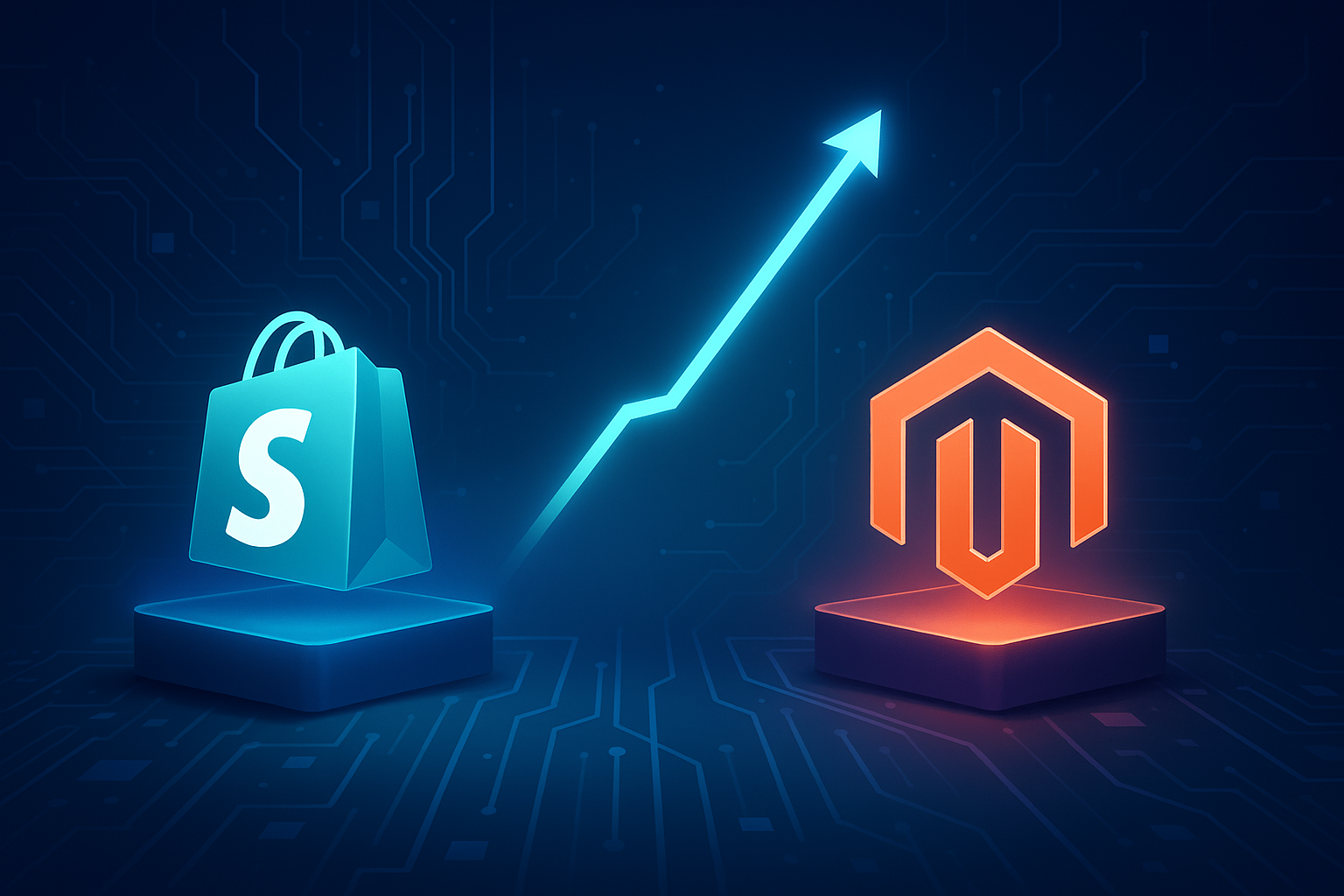
For startups and small businesses focusing on quick market entry and cost savings, Shopify is likely the better choice. Its Shopify PPC advertising tools allow rapid campaign setup and effective budget use.
These businesses benefit from Shopify’s scalability and robust ecosystem, but may start integrating some custom marketing tools to support growing PPC campaigns.
Magento shines for large enterprises with complex PPC needs—such as segmented campaigns across countries, currencies, or extensive product lines. Though pricier and more complex, Magento enables deeply customized PPC experiences, driving higher ROI for large retailers.
At Bud, a trusted PPC agency in Chennai, we specialize in optimized PPC strategies tailored to both Shopify and Magento platforms. We understand the nuances of each platform’s capabilities and limitations, and help clients:
Our expertise enables clients across Chennai and India to harness ecommerce paid ads effectively, delivering measurable growth and improved returns. You can learn more about our services at Bud.
There is no one-size-fits-all answer to whether Shopify vs Magento for PPC is the better choice. Each platform carries unique advantages relative to business size, technical capacity, and campaign complexity.
Shopify’s strength lies in its ease of use, quick deployment, and cost efficiency, making it ideal for small to mid-sized businesses looking for rapid PPC impact.
Magento offers unmatched customization and scalability for large and complex ecommerce operations, delivering high PPC ROI when managed by skilled developers and marketers.
An experienced e-commerce advertising agency in Chennai, such as Bud, can provide tailored PPC management services on either platform, ensuring your ad spend converts into real growth.
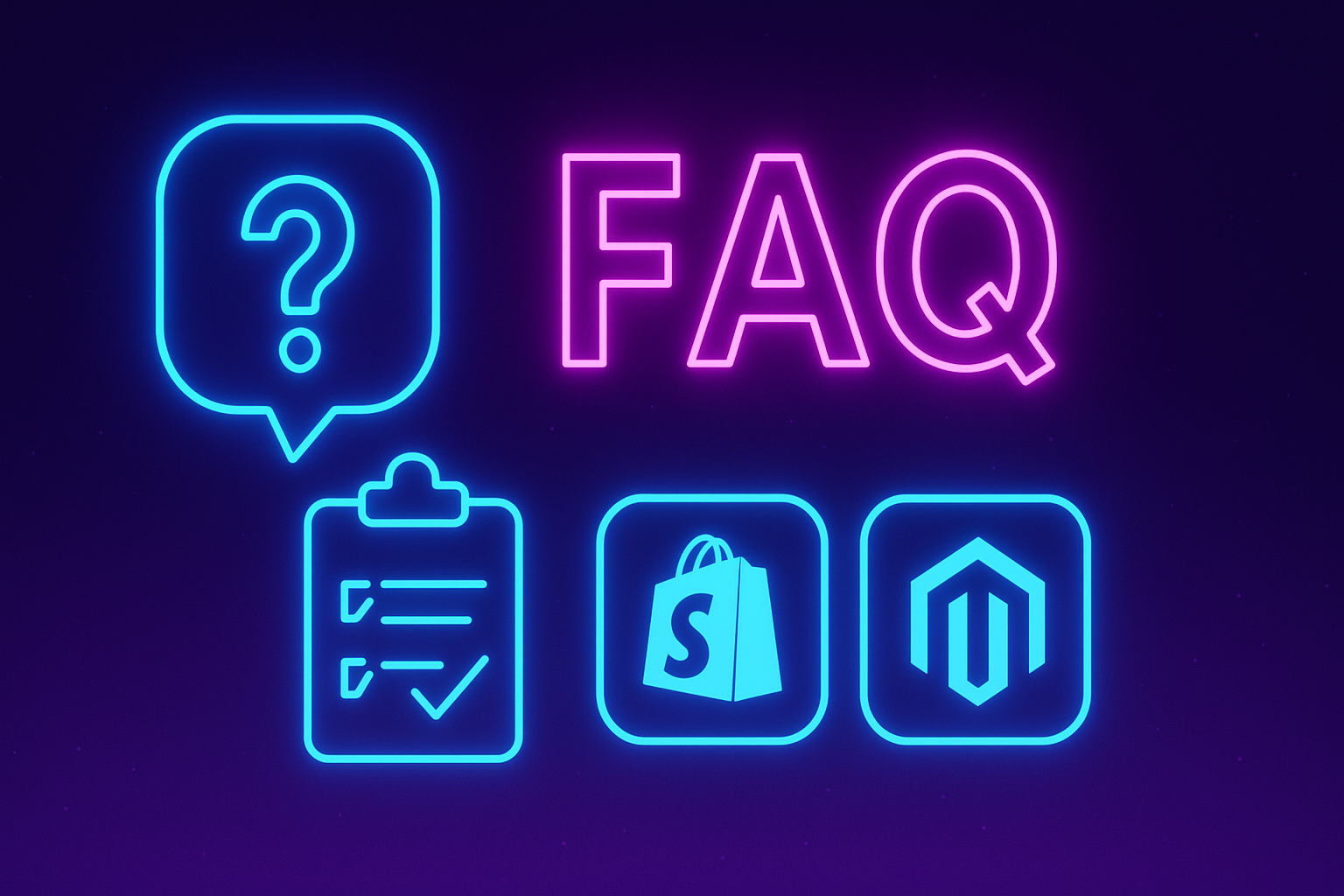
Shopify offers easier campaign setup and management, while Magento supports complex, customizable campaigns. The best depends on your business scale and PPC needs.
The platform impacts technical integration, tracking fidelity, user experience, and campaign flexibility, all influencing ROI.
Yes. Agencies like Bud expertly manage campaigns on Shopify and Magento, driving targeted traffic and improving conversions.
Shopify usually has lower upfront and running costs, allowing more ad budget, whereas Magento requires a larger investment but supports extensive customization.